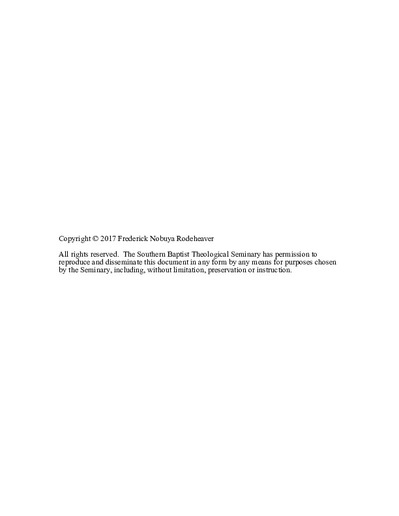The Meaning of Being: the Challenges of Existential Psychology for Biblical Counseling
Abstract
ABSTRACT
The Meaning of Being:
The Challenges of Existential Psychology
for Biblical Counseling
Frederick Nobuya Rodeheaver
In fulfillment for the degree Doctor of Philosophy
The Southern Baptist Theological Seminary
2017
Chair: Dr. Jeremy Pierre
The thesis of this dissertation is that any anthropology that guides pastoral counseling must account for the totality of the human experience, including an individual’s subjective experience of his or her life. Existential psychology, while captive to its own faulty assumptions, has made this kind of anthropological subjectivity a primary focus and thus becomes a helpful dialog partner to the biblical counseling movement in its continued trajectory of theoretical and methodological refinement. This dissertation concludes that while the insights of existential psychology are helpful to biblical counseling, due to its naturalistic assumptions their own therapeutic foci are more comprehensively answered from a theological framework, specifically in the doctrines of the imago Dei, and Christology. The study concludes with practical applications of existential psychology’s insights in the counseling relationship after they have been recast into a Christological context.
Chapter 2 examines existential psychology in detail with particular emphasis on its key distinctive; a focus on existence instead of essence. The chapter concludes with a discussion explaining the failure of existential psychology to be the corrective to human understanding that its proponents hoped it to be.
Chapter 3 investigates the three unique foci that existential psychology stresses to capture or understand personal subjectivity; the pursuit of authenticity, the problem of anxiety and the question of authority & autonomy.
Chapter 4 recasts the very issues of chapter 3 in a Christological context based upon the imago Dei and its corollary doctrine the imago Christi. This recasting provides a surer foundation to the very issues that existential psychology emphasizes and provides the theological link to the therapeutic advantage that is found in existential psychology’s insight and techniques.
Chapter 5 provides the practical application of the insights and discoveries of chapters 2 through 4 to the counseling relationship between the biblical counselor and counselee.
Chapter 6 summarizes the main arguments of the dissertation and provides recommendations for future research.

